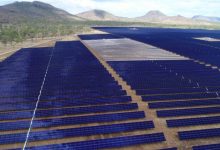The growth of large-scale solar plants, and the continuing surge in rooftop solar installations, is being credited for the ongoing fall in greenhouse gas emissions in Australia’s main grid, one of the only bright spots in Australia’s efforts to reduce its overall emissions.
The latest data from The Australia Institute’s National Energy Emissions Audit shows that solar is the fastest growing source of electricity in Australia, and the share of wind and solar in recent months has averaged 14-15 per cent.
If you add in hydro, that has taken the share of renewables in Australia’s main grid to around 22 per cent, the study says, and this is helping to achieve an ongoing fall in annual emissions.
“(The) continued fall in annual emissions over the past few months has been mainly driven by a large absolute increase in large-scale solar generation,” lead author Hugh Saddler writes in his notes.
“Rapidly falling gas generation, which was previously a major driver of falling emissions, appears for now to have ended, with annual gas generation almost constant since December last year.
 “The dramatic increase in grid-scale solar generation has contributed to renewables supplying monthly 14-15 per cent of total generation (including rooftop solar) since last November. This is a dramatic increase in the average 10-11 per cent share this time last year.”
“The dramatic increase in grid-scale solar generation has contributed to renewables supplying monthly 14-15 per cent of total generation (including rooftop solar) since last November. This is a dramatic increase in the average 10-11 per cent share this time last year.”
Of particular note is the jump in commercial-scale rooftop solar installations, as more business customers turn to solar.
 The fall in emissions in the electricity grid is one of the only bright spots in Australia’s emissions profile, with even government figures showing a sharp increase since the abolition of the carbon price, and no anticipated fall by 2030, when Australia is supposed to have cut emissions by 26-28 per cent, at the very least.
The fall in emissions in the electricity grid is one of the only bright spots in Australia’s emissions profile, with even government figures showing a sharp increase since the abolition of the carbon price, and no anticipated fall by 2030, when Australia is supposed to have cut emissions by 26-28 per cent, at the very least.
The Coalition government – which has no emissions reduction policy apart from $3.5 billion allocated to a discredited auction scheme over 15 years – is now resorting to Abbott-era scare campaigns against Labor’s target of a 45 per cent cut in emissions by 2030, and the widening of the Coalition’s own so-called “safeguards” mechanism.
After ginning up the electorate with warnings that Australia faced “$100 meat trays” and the end of sausage sizzle fundraisers, the Coalition has launched a new and extraordinary scare campaign against the potential cost of Labor’s policy.
The Coalition’s safeguards mechanism is effectively toothless as it does not require the targeted companies to reduce emissions. Labor, however, is expanding this scheme to 250 companies, setting tighter “baselines” and giving these companies the opportunity to either reduce emissions themselves, or buy “credits” if that turns out to be a cheaper option.
Labor describes the Coalition scare campaign as “fake news from a climate change fraud” and not worth the paper they’re written on.
“Modelling that assumes such a high offset price is weird, wacky and wrong,” said Opposition climate spokesman Mark Butler, who insisted that the Coalition reveal who has funded the so-called “research”.
“If a cent of taxpayers’ money was used to come up with these dodgy numbers, then the Liberals should pay it all back immediately. Anything less would be a shocking abuse of taxpayers’ funds,” he said.
“While Scott Morrison wastes billions of dollars on a plan that doesn’t reduce pollution, Labor is working with industry to reduce pollution, keep power prices lower and create thousands of new jobs in renewables.
“In order to distract from their climate chaos, the Liberals will do anything to convince Australians there is no need for real climate action.”
The Australia Institute’s Richie Merzian also has a useful twitter thread that debunks the claims made by the Coalition via the Murdoch media.
TAI has tried to turn around the debate by saying that Australia’s GDP would avoid a hit of $130 billion a year if it took climate action seriously. “Analysis that ignores the economic benefits of acting on climate and only focuses on costs is misleading,” it says.










